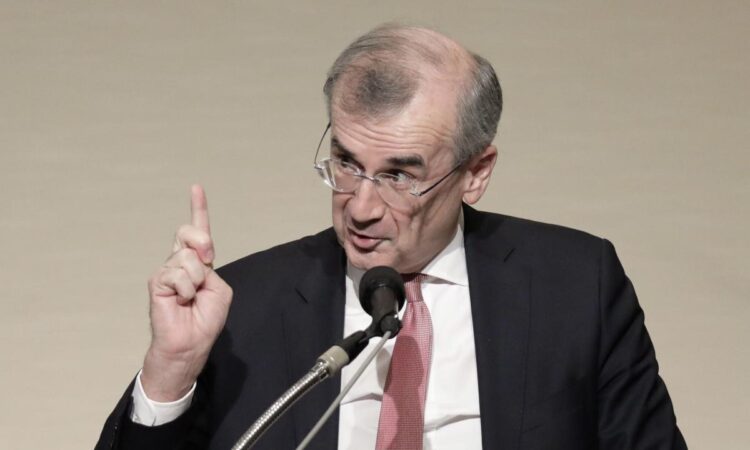
(Bloomberg) — Europe needs a plan to deepen its financial and economic unity if it is to emerge from crises affecting its democracy and society, the chief of France’s central bank said.
Most Read from Bloomberg
Addressing students in Frankfurt, Francois Villeroy de Galhau said a “bold strategy” to overcome the challenges could include a unified industrial policy and fiscal capacity, and renewed political impetus for the creation of a pan-European capital market.
Such ideas should be backed by a Franco-German ambition and become part of debate ahead of EU parliament elections in June, he said.
“The dangerous world of 2023 requires the reawakening of Europe, a force for peace and cooperation,” the central banker said. “And the anxious Europeans of 2023 need the reawakening of Europe, if we are to fulfill our promise of a sustainable prosperity.”
The French official’s warning highlights risks facing the EU in the coming months as the economy teeters on the verge of recession and political parties bent on picking apart the union poll strongly ahead of the elections. Villeroy said the vote for the EU parliament is likely to reveal the crises, or even ignite it.
According to Villeroy, neither Europe nor the Franco-German alliance is in good shape, battered by Russia’s invasion of Ukraine, widespread distrust of political leaders, and the squeeze of inflation on the poorest citizens.
This weakness, Villeroy said, comes as the EU faces the economic challenges of financing the digital and green transitions and boosting labor skills as populations age.
The Frenchman spoke ahead of a two-day meeting of the European Central Bank Governing Council, which means he’s not allowed to comment on monetary policy. Villeroy stuck to the rules, only noting that euro-area inflation has slowed to 2.4% — down from an October 2022 peak of 10.6%.
“The path between these two figures is impressive,” he said.
One recent economic issue he flagged is a surge in national state-aid and measures to mitigate high energy prices, which have given a competitive edge to the countries able to spend the most. To avoid a repeat of this when financing climate investment, Villeroy said a EU-wide fiscal capacity could help, as well an industrial policy with cross-border strategy.
But he said most of the financing for the digital and green transitions must come from the private sector. To that end, he said the project for a Capital Markets Union, or CMU, should be led at the highest political level to avoid the inertia of technical details.
He said tools for the CMU could include a new type of investment contract to tempt in private funding in the wake of the public sector.
Villeroy also said capital union needs an increased supply of euro-denominated safe assets, like the recovery-fund bonds. That could be done in part by combining the issuances of the European Stability Mechanism, the European Commission and potentially the European Investment Bank, he said.
“When it comes to solutions, a feeling of powerlessness appears to loom, as Europe is trapped by an overly-domestic and short-term agenda,” Villeroy said. “This European torpor is all the more irksome in the face of American speed and Chinese assertiveness, but it is by no means a fatality.”
–With assistance from Christoph Rauwald.
(Updates with comments on European safe assets in penultimate paragraph.)
Most Read from Bloomberg Businessweek
©2023 Bloomberg L.P.






